On March 22, UBC’s Department of French, Hispanic and Italian Studies will have the pleasure of welcoming Louis-Karl Picard-Sioui for a discussion on Francophone Indigenous Literature published in Quebec. In this interview, Dr. Joël Castonguay-Bélanger speaks with Louis-Karl Picard-Sioui about the initiatives and challenges to increase visibility for Indigenous authors.
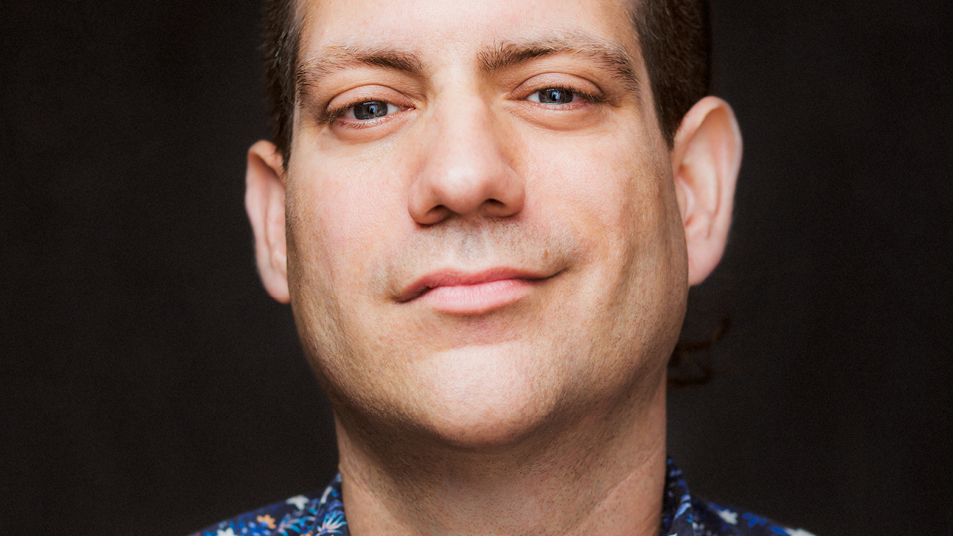

Louis-Karl Picard-Sioui. Credits: Helene Bouffard.
About Louis-Karl Picard-Sioui: Born and raised in Wendake, Quebec, and a member of the Wendat nation, Louis-Karl Picard-Sioui is a writer, poet, performer, historian and anthropologist. For more than 15 years, he has been actively promoting Indigenous arts and cultures. He is the co-founder of the Salon du livre des Premières Nations and director of Kwahiatonk!, the only Canadian Francophone NPO entirely dedicated to the promotion and dissemination of Indigenous literature. In 2017, he published his first collection of short stories, Chroniques de Kitchike : la grande débarque (Éditions Hannenorak), recently translated into English under the title The Chronicles of Kitchike: Taking a Hard Fall (Exile Editions, 2022). His poetry collection Les visages de la terre was a finalist for the Governor General’s Literary Awards in 2020.
Growing Visibility
“Back then, no Indigenous writer was ever invited to the province’s festivals and book fairs. It’s like we didn’t exist. Now, you can’t imagine such an event without Indigenous participation.”
Joël Castonguay-Bélanger (JCB):
Kwe Louis-Karl. Thank you so much for accepting the invitation of the Department of French, Hispanic and Italian Studies to talk about Francophone Indigenous Literature in Quebec.
First, I would like to hear your thoughts and how you would describe the current momentum experienced by Indigenous literature in this province. After years of neglect, Indigenous voices seem to finally be gaining more and more visibility and recognition. Books by Indigenous authors benefit from more exposure in the media, they are read by a growing audience, awarded prizes, and studying them at university is no longer an exception.
Louis-Karl Picard-Sioui (LKPS):
The momentum is indeed pretty good for Indigenous literature in Quebec. After years of hard work, it finally seems like the media and the public are taking notice, which is great.
I don’t have a magic answer regarding the question “why now?” But there are a number of factors that must be taken into account. Namely, the number of authors and publications has grown a lot in the last five, ten years. There is more diversity on the shelves. Maybe we’ve reached some kind of critical mass and can’t be ignored any more. Some awards have also brought the attention of a more mainstream public to books that, in the past, would have been quickly forgotten, like Michel Jean’s Kukum.
New authors may not realize it, and probably the public doesn’t know about it, but ten years ago, we had absolutely no visibility in Quebec. It felt like the industry didn’t want our literature to exist. We had to fight to have exposure, to organize our own fringe events, like the Salon du livre des Premières Nations, because back then no Indigenous writer was ever invited to the province’s festivals and book fairs. It’s like we didn’t exist. Now, you can’t imagine such an event without Indigenous participation. Which is weighing hard on our shoulders, because there are a lot more events in Quebec than Indigenous authors!
Also, you mentioned universities, and on that front, and also in education in general, I would say there is still a lot of work to be done. Some professors are doing amazing work teaching First Nations and Inuit literature, but it’s still mainly optional. As far as I know, the only exception is being implemented right now and it’s at Université Laval in Quebec City: if you want a first degree in literature, Indigenous literature of Quebec will soon be a mandatory course. Which makes sense. And from my point of view, Indigenous literature should be mandatory in Quebec as soon as high school. We are not there yet, but I’m optimistic I’ll see it in my lifetime. Ten years ago, I wouldn’t have hoped.
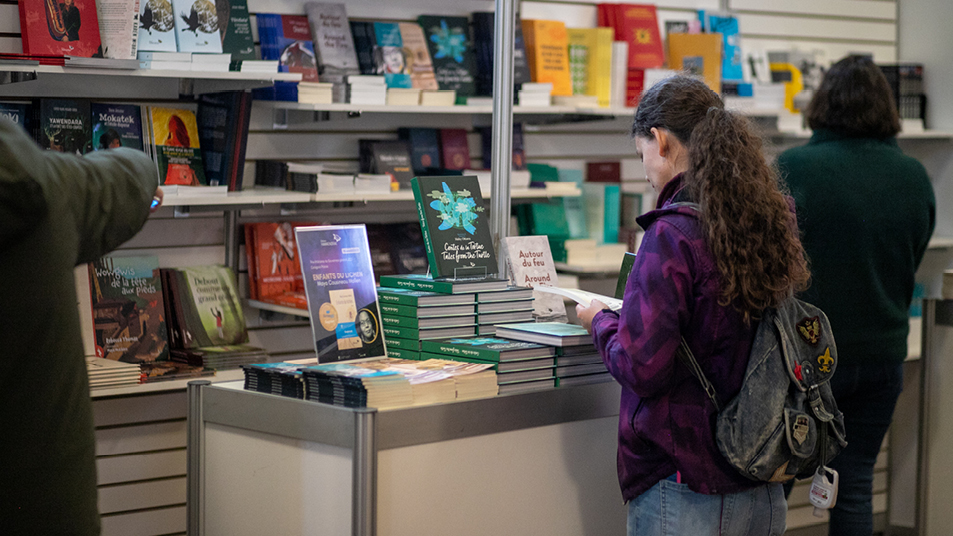

Salon du livre des Premières Nations. Credits: Nicolas Ottawa/Kwahiatonhk!
Double Marginalization
“Each time you talk about Indigenous literature in Canada and omit the Indigenous writers from Quebec that don’t use English, you are committing the colonial act of erasure.”
JCB:
And yet, beyond the undeniable signs that ‘something is happening’, one could still feel like Francophone Indigenous Literature remains one of the most overlooked literatures in Canada. The linguistic divide that exists between English and French literary productions seems to complicate the exchanges between English- and French-speaking Indigenous writers within the country, and maybe even within the province itself. Do you agree with this observation? How do Francophone Indigenous writers experience the double marginalization that comes from both the enduring difficulty of being heard as an Indigenous writer in Canada, and a context in which Francophone literary production sometimes has a hard time being recognized and heard outside Quebec?
LKPS:
Oh, I do agree, yes. And I still haven’t figured out how to solve that problem. For sure, the linguistic divide in our country is way deeper than Indigenous literature. You could argue that the basic problem is simple: Indigenous or not, most Canadians that have English as their first language are not fluent enough in French to read and appreciate literature in that language. But obviously, it doesn’t stop there, because more and more Indigenous titles are translated from French to English, and the divide still continues. It’s true in research, in anthologies and other productions.
From my humble point of view, it feels like Indigenous literary research and the milieu outside of Quebec have integrated, at least at some level, the settlers’ point of view that English is the standard language of literature. Which doesn’t make any kind of sense in our day and age where everybody seems obsessed with decoloniality and indigenization. But whatever the reasons, we still have to fight against that void, which can result in a complete erasure from history. Like, how many times do we see lists or chronologies or anthologies of « Indigenous lit from Canada » with absolutely no mention of books written in French?
So, what I’ve been telling scholars and publishers and such, for some years now, is this: each time you talk about Indigenous literature in Canada and omit the Indigenous writers from Quebec that don’t use English, you are committing the colonial act of erasure. Now, if you are not interested in our stuff or you can’t read it because the education system failed you, I understand, but that does not give you the right to erase others from history. Because there is a really simple way of avoiding most harm: you just have to acknowledge the limits of your project by adding « in English » after « Indigenous lit ». Plus, that’s an easy way out for not changing anything while still looking good. Kind of like those « land acknowledgments », when you think about it.
Like I said, I haven’t resolved that one yet and I may never do so. What I’ve been doing for a while now is inviting Indigenous writers that write in English to my own events in Quebec. Like at the Salon du livre des Premières Nations, each year, we have around 20 Indigenous authors, and I try to keep the ratio 75% in French and 25% in English to create connections, awareness and friendships across the linguistic divide. Because it’s easier to pretend Indigenous literature in French doesn’t exist when you don’t know any authors. It’s human nature.
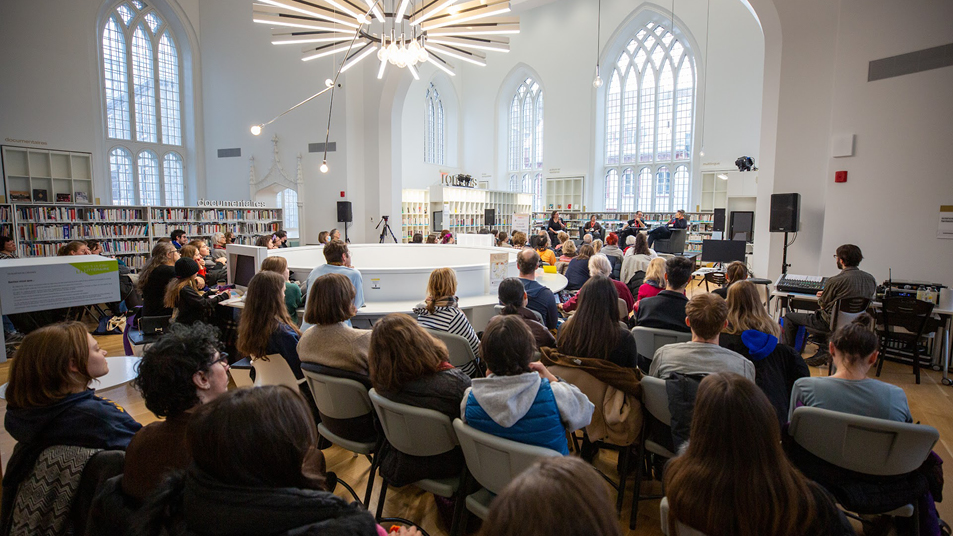

Salon du livre des Premières Nations. Credits: Nicolas Ottawa/Kwahiatonhk!
Salon du livre des Premières Nations & Kwahiatonhk!
“You could actually say that we invented the market for Indigenous literature in Quebec, because before the Salon du livre des Premières Nations—although we already had amazing authors and books—nobody took notice.”
JCB:
The Salon du livre des Premières Nations and Kwahiatonhk! are two excellent examples of your own engagement to create these connections, bring authors and readers together, and give visibility to Indigenous literature in Quebec and in Canada. What role did these two initiatives play in the momentum that you described earlier?
LKPS:
The Salon du livre des Premières Nations (SLPN) is the only annual event of its kind in Canada. It’s both a festival and a book fair centered around Indigenous writers from Quebec and Canada. We have activities for adults, literary shows, activities for schools, for kids… All kind of stuff.
The event was first created by the Hannenorak Bookstore in Wendake in 2011, because back in the day, Indigenous literatures were nowhere to be seen in literary events. Not in our province. So, we had to build our own event and promote it. In the beginning, it was really niche and was held at the community hall on the reserve. But from the start, we introduced new authors that are now really important in Quebec, like Marie-Andrée Gill and later, Naomi Fontaine. So yeah, I believe the role of the SLPN has been important. You could actually say that we invented the market for Indigenous literature in Quebec, because before the SLPN—although we already had amazing authors and books—nobody took notice.
As for Kwahiatonhk!, it is a non-profit organization that we created in 2015, first to take over the organization of the SLPN, and also develop other initiatives around Indigenous literatures in Quebec. We developed podcasts, a website, a touring literary exhibit called « Le Legs », our Literary Bingo show that toured in Quebec and Ontario, and an Indigenous creative residency at the Maison de la littérature.
Chroniques de Kitchike
JCB:
You also mentioned that more and more books are being translated from French to English. Your own collection of short stories, Chroniques de Kitchike, first published in French in 2017 by Éditions Hannenorak, has been translated into English by Kathryn Gabinet-Kroo and was published just last fall (The Chronicles Of Kitchike, Exile Editions, 2022). What has been the reception so far?
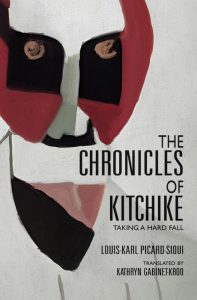

The Chronicles Of Kitchike by Louis-Karl Picard-Sioui, translated into English by Kathryn Gabinet-Kroo (Exile Editions, 2022).
LKPS:
To be honest, reception is just non-existent for now. It hardly had a reception. Which could tend to prove what I was saying earlier. To be fair, though, it took a while to have some reviews of the original too. But, five years later, there are still people discovering it for the first time and it’s great, because it means that book is in for the long run.
And I understand that, as an author, I also have a responsibility to promote the book in English, which is more difficult to do from Wendake than in Toronto or Vancouver. But I’m working on that. Also, I must say that at least some Indigenous authors from Quebec did have some critical success with their English translation, like Virginia Pésémapéo Bordeleau. They are the exception for now, but things change.
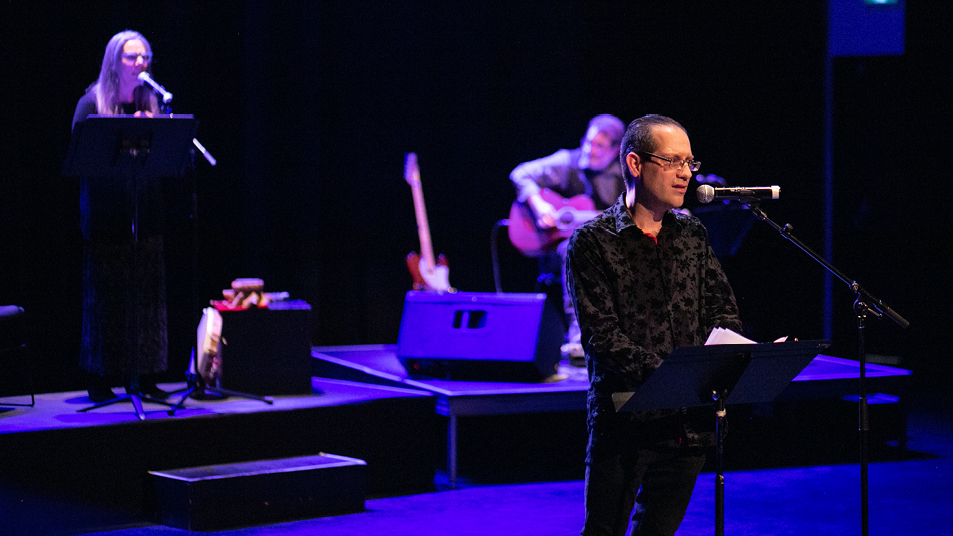

Salon du livre des Premières Nations. Credits: Nicolas Ottawa/Kwahiatonhk!
Wendat Language Revitalization
“I’ve been involved in the Wendat language revitalization process since my teenage years, because you need the language to understand the culture. Colonial languages, either French or English, are tools to be used. And they can be beautiful tools, but they can’t fully express our cultures and perspectives.”
JCB:
So far, we have talked about the specific dynamics between French and English in Canadian literature, and its impact on the visibility of the lndigenous literary production coming from Quebec. Of course, this linguistic divide between the two official languages is not the whole story. How can Indigenous languages find their space in this context? You have yourself published poems written in French and Wendat in Les visages de la terre. What does writing in Wendat mean for you?
LKPS:
Well, that is a whole other question. Because when you talk about Indigenous languages, you raise the question: who do you write for? And there is no easy answer to that. As much as I’d like to say that I write for my own, for the Wendat and other First Nations in Quebec, the economic truth is there aren’t enough readers, or even individuals, to be able to make it worthwhile in terms of sales figures. So, yeah, for example, my Kitchike stories were tailored for Indigenous peoples first and foremost, but their success is still mainly due to the Quebecois readers.
Generally, in Quebec, most First Nations persons still have their Indigenous language as mother tongue, though there are a lot of differences from nation to nation and even from community to community. Like, there are no fluent speakers of the Wendat language in my community, and almost none for the Abenakis or Malecite communities in Quebec. On the other hand, almost all of the Atikamekw people (around 8000, divided into three communities) are fluent in their Indigenous tongue. In fact, French is sometimes a rough second language, and English, well, a distant third one. So, you could think that the economy of writing in an Indigenous language depends on the number of speakers, but then again, you have to take into account that speaking isn’t reading, even in your mother tongue. Because even for the nations that kept their language quite alive and well, there was so little to read for so long that it’s not always easy for a fluent speaker to read in their mother tongue. Often, it’s easier for them to read in French.
So, there is not much of a public for writing in Indigenous languages yet. But that doesn’t mean we can’t or shouldn’t do it. In fact, I think that we should, as an act of defiance, of survival. For our kids, for the next generations. That’s why I chose to write some poems in Wendat in my last collection. Because I’m one of the really few that actually could do it. Even if I knew that there were around five people in the whole world who could actually understand it. (Well, maybe more, taking into account diverse Haudenosaunee speakers that maybe could decipher it though language proximity.)
My point was: those who understand will understand. And maybe, hopefully, it will help raise awareness and interest for our language—among our own people. I’ve been involved in the Wendat language revitalization process since my teenage years, because you need the language to understand the culture. Colonial languages, either French or English, are tools to be used. And they can be beautiful tools, but they can’t fully express our cultures and perspectives.
Anyway, I just learned, not long ago, that my poems were used in the Wendat class in my community. That made me feel pretty good. Because we’ve got a duty toward our ancestors and the future generations. It’s even more important in Quebec, with the new colonial law, « Loi sur la langue officielle et commune du Québec, le français » (Bill 96), voted to erase even more the use of our languages in our own land. We’ve got to fight even more strongly for our Indigenous languages.
Like I said earlier: the education system is failing Canadians. There are absolutely no reasons why most Canadians shouldn’t be fluent in both colonial (« official ») languages AND the traditional Indigenous language of their region. I’m pretty sure that knowing three languages is still way under the human standard, at the scale of planet Earth.
JCB:
It’s definitely something that we notice here in Vancouver, where many of our students choose to study French, Spanish, Italian or Portuguese as a third language (or fourth or fifth…). UBC also has a pretty dynamic program which offers courses in First Nations languages, and methodology classes on language documentation, conservation and revitalization. Can you tell us more about your own involvement with the Wendat language revitalization process? Beyond the incredible website that already exists, what is your hope for the reconstruction and restoration of this ancestral language that, since the 19th century, has been considered ‘dormant’?
LKPS:
Well, like I said, I’ve been involved since my teenage years. It’s a difficult situation because, as you said, there were no living speakers. In my community, the last fluent speakers died in the 19th century. We do have a lot of written resources, though. A lot of dictionaries, grammar, and a lot of notes taken by the missionaries since the earliest contact. Even an audio recording of a Wendat woman from the States, from the mid-20th century. Probably the last fluent speaker.
Anyway, in Wendake, the need to return to our language was felt in the 1980s, and even more in the 1990s. It had a lot to do with the return to traditional spirituality, which demanded a way to talk to the Ancestors in their language. So, we were a small group of people getting together and trying to learn what we could. Mainly people from the Longhouse.
We also lobbied the Band Council so that they put aside the necessary money for research and teaching. It wasn’t easy, because I guess back then you had to be a little bit crazy to believe in it. But, in time, we were able to convince some key actors. And in the early 2000s, we had access to SSHRC funding through a Community-University Research Alliance between Wendake and Université Laval. The Yawenda project, as it was called, helped us get organized research-wise. Many linguists from across Turtle Island were involved.
As for myself, I have been involved in most Wendat language committees for the last 20+ years. The orthographic standardization committee, the lexical innovation committee… I also developed the basis of the Wendat language program at the Centre de développement de la formation et de la main-d’oeuvre Huron-Wendat (CDFM), which is an adult high school in Wendake.
Right now, one of the great initiatives regarding our language is actually taking place in BC. Professor Megan Lukaniec, who is a Wendat linguist from our nation, has been digitalizing resources and building an online Wendat dictionary at the University of Victoria. The project is called « Kwakwendahchondiahk », meaning « we are building our words / voice / language ». It’s a work in progress, but it’s available online.
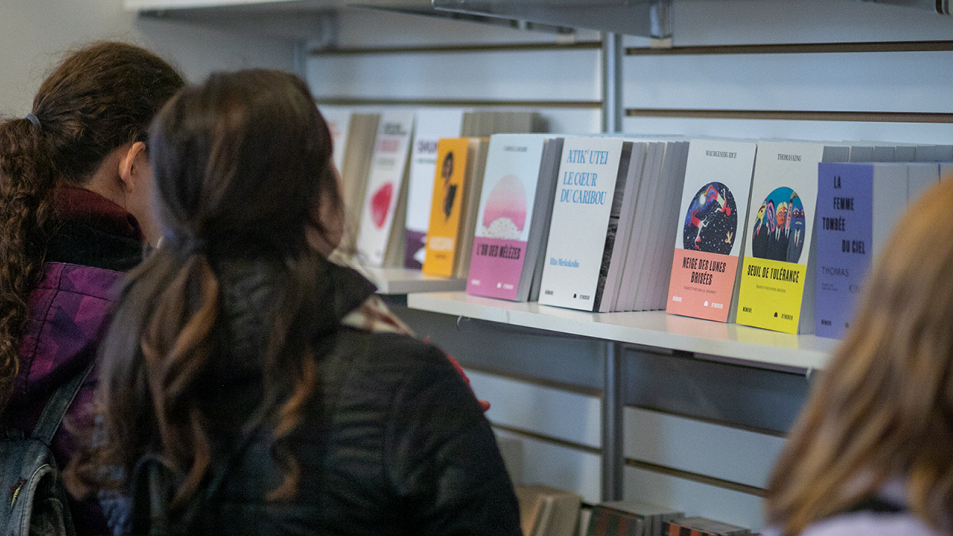

Salon du livre des Premières Nations. Credits: Nicolas Ottawa/Kwahiatonhk!
Exploring Indigenous Literature from Quebec
JCB:
Lastly, if someone wanted to learn more about Indigenous writers from Quebec but can’t read French or doesn’t know where to start, what would be your recommendation?
LKPS:
That’s an excellent question, because there is no anthology of Indigenous literature from Quebec available in English. There are some collections that were translated, though, and more and more novels and poetry books. The short stories collection Amun: A Gathering of Indigenous Stories (Michel Jean, dir., Exile Editions, 2020) is a good place to start, because you can read really diverse Indigenous authors from Quebec, from the reservation and from the city, various nations and generations.
I would also recommend the classic from An Antane Kapesh, Eukuan nin matshi-manitu innushkueu / I Am a Dawn Savage followed by Tanite nene etutamin nitassi? / What Have You Done to My Country? (Wilfrid Laurier University Press, 2019) translated by professor Sarah Henzi from SFU. Antane Kapesh is considered by many to be the first published Indigenous author in Quebec. Though the assumption is technically false, the influence of her work is huge. I would also recommend Of Vengeance (Dundurn Press, 2019) by Innu writer J. D. Kurtness, which is a personal favorite of mine. It’s a serial killer story.
Then again, I must recommend my own stuff. The Chronicles of Kitchike: Taking a Hard Fall (2022) is available everywhere right now from Exile Editions. And I know that Kathryn, the translator, has begun working on the follow-up that was just published in French last fall. I heard that the publisher was interested too, so I’m pretty confident it will happen sooner than later. So, you’ve got to read the first volume right now, to be ready when the other one comes out!
Also, on the Kwahiatonhk! website, we try to list everything that comes out. You will find the available English translations under the tab « œuvres en traduction anglaises ». We try (and fail) to keep it up to date.
JCB:
Well, in this case, I like to think that having a hard time keeping up with all the publications is a good sign. Thank you so much for taking the time to share your thoughts with us. I am very much looking forward to continuing our conversation in person, at UBC, on March 22.


